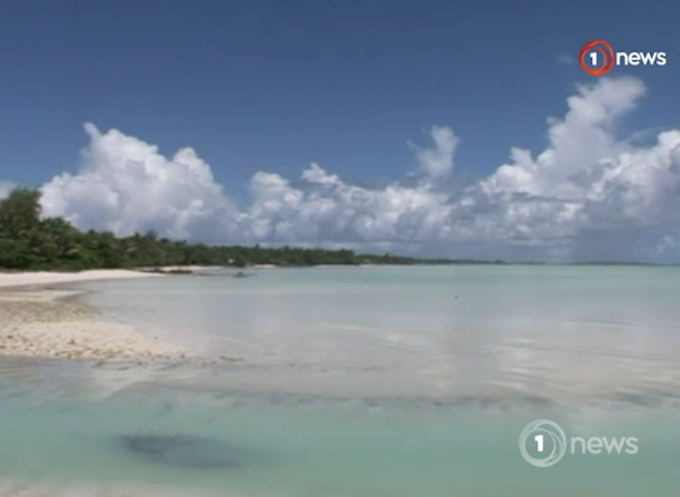
COMMENTARY: By Prue Taylor in Auckland
From 1949 to 1996 more than 300 nuclear devices were detonated in the Pacific. In the mid-1990s a generation of political leaders had the foresight, wisdom and courage to support a civil society initiative that led to an International Court of Justice advisory opinion on the legality of the threat or use of nuclear weapons.
The resultant 1996 decision became a legal landmark.
Today we face another threat just as grave – the climate crisis. The risks and threats to peace and security posed by the climate emergency are as real and as avoidable as those posed by nuclear weapons.
- READ MORE: The insecurity legacy of the Rainbow Warrior Affair: A human rights transition from nuclear to climate-change refugees – David Robie
- US Vice-President Kamala Harris pushes for unity at Pacific Islands Forum
- Other Pacific climate change reports
And while here in New Zealand we’re only just seeing the first fires from the climate crisis today, the Pacific has been experiencing the impacts of climate destruction for decades.
Top of the agenda at this month’s Pacific Islands Forum meeting in Fiji was, of course, climate change. Specifically, states have been asked to support an initiative to take climate change directly to the International Court of Justice (ICJ).
The ICJ will be asked for an advisory opinion on the legal obligations of states. Although non-binding, an advisory opinion from the court can trigger positive legal change.
Pacific youth are putting their faith in the ICJ — just like New Zealand did with its nuclear-free moment — to demonstrate what responsibility for future generations actually means. They are asking our government to help, but will New Zealand remember its history and answer the call of a new generation?
Youth inspired Vanuatu
Pacific youth inspired the Vanuatu government to lead a formal state process involving a United Nations General Assembly resolution.
They chose well. Vanuatu has dedicated significant political and diplomatic effort to the initiative. Caribbean states are on board too.
But to get it across the line, New Zealand’s active support and leadership is critical. A unified position in the Pacific (including Australia) will greatly bolster international support. This week’s Pacific Islands Forum meeting is the place to get it.
Prime Minister Jacinda Ardern is well aware that climate change is the No 1 issue for the Pacific, in both socio-ecological and geopolitical contexts. Thus far, the government has accepted an advisory opinion on climate change as a “constructive proposal” with potential for creating “significant legal development” and has said it is willing to “engage” with partners.
While this is a good start, it is now time (as a matter of urgency) for New Zealand to significantly step up its support for the ICJ move. It can do this now by actively and openly backing the Vanuatu government and others to build a coalition of supportive states in the region and internationally.
Better still, why not become a co-sponsor of the UN General Assembly resolution?
This is exactly what Ardern’s government is now being called upon to do. An open letter from prominent New Zealanders, including Māori and Pasifika leaders from academia, civil society, such as Oxfam Aotearoa, and scientific and spiritual communities urges the government to take leadership.
Reminds government on kaitiakitanga
The letter reminds the government of its commitment to the values of intergenerational justice and kaitiakitanga, both for the peoples of the Pacific and Aotearoa New Zealand. Critically, it reminds today’s leaders of New Zealand’s history.
The Power of the People.
The democratic deficit in international policy and law is well known. Youth do not have a seat at the table, and they know it. Their futures are negotiated behind closed doors where intergenerational justice is a political slogan at best.
I have personally seen the injustice of this many times at international treaty negotiations on climate change and the oceans.
In the face of this hard reality, the world’s youth still show up and speak up with passion and commitment. They remain committed to being constructive.
Pacific youth see an ICJ advisory opinion on climate change in exactly these terms. However, they need the help of our political leaders at the table, and they need it right now, to acknowledge climate change as real and immediate.
To deny them this vital legal opportunity is both immoral and brutal.
So will New Zealand show real solidarity with youth and peoples of the Pacific?
Will it honour its own history and reputation as an independent leader on global issues critical to the future of humanity and all life?
Or will this legacy be sacrificed on the altar of expediency and short-term national interests?
If youth are to keep their faith in us, then we must act urgently and decisively in their best interests.
Prue Taylor is a senior lecturer in environmental and planning law at the University of Auckland. This article first appeared on Stuff and is republished here with the author’s permission.













































